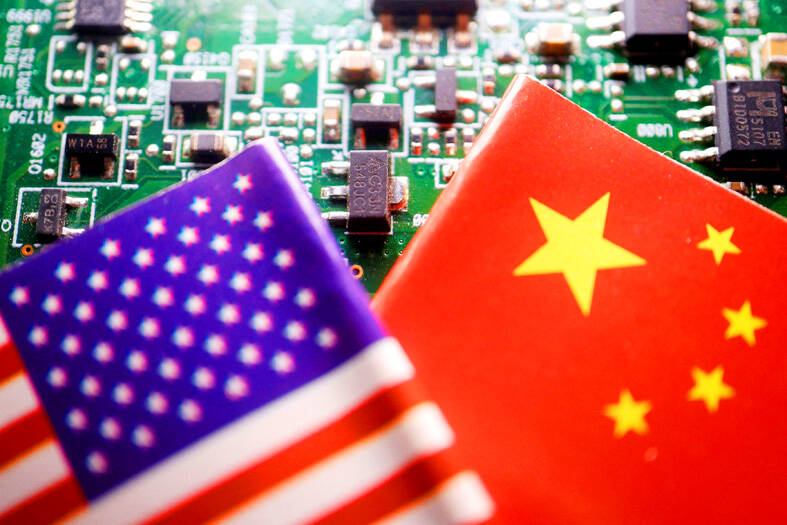US President Joe Biden’s administration could unveil new export restrictions on China as soon as this week, the US Chamber of Commerce told members in an e-mail on Thursday last week.
The new regulations could add up to 200 Chinese chip companies to a trade restriction list that bars most US suppliers from shipping goods to the targeted firms, the e-mail from the powerful Washington-based lobbying group said, according to an excerpt seen by Reuters on Friday.
The US Department of Commerce, which oversees US export policy, plans to publish the new regulations “prior to the Thanksgiving break” on Thursday, according to the e-mail.

Photo: REUTERS
The US Chamber of Commerce did not respond to a request for comment.
The commerce department declined to comment.
The update, if accurate, shows the Biden administration is plowing ahead with plans to further crack down on China’s access to semiconductors even as the start of US president-elect Donald Trump’s second term in January approaches.
Another set of rules curbing shipments of high-bandwidth memory chips to China is expected to be unveiled next month as part of a broader artificial intelligence package, the e-mail said.
Biden has slapped a raft of export controls on China aimed at halting its technological advances, amid fears the technology could be used to bolster China’s military.
Sources briefed on the matter said the first round of regulations would likely include restrictions on chipmaking tool shipments to China.

Taiwan Semiconductor Manufacturing Co (TSMC, 台積電) yesterday said that its investment plan in Arizona is going according to schedule, following a local media report claiming that the company is planning to break ground on its third wafer fab in the US in June. In a statement, TSMC said it does not comment on market speculation, but that its investments in Arizona are proceeding well. TSMC is investing more than US$65 billion in Arizona to build three advanced wafer fabs. The first one has started production using the 4-nanometer (nm) process, while the second one would start mass production using the

When an apartment comes up for rent in Germany’s big cities, hundreds of prospective tenants often queue down the street to view it, but the acute shortage of affordable housing is getting scant attention ahead of today’s snap general election. “Housing is one of the main problems for people, but nobody talks about it, nobody takes it seriously,” said Andreas Ibel, president of Build Europe, an association representing housing developers. Migration and the sluggish economy top the list of voters’ concerns, but analysts say housing policy fails to break through as returns on investment take time to register, making the

‘SILVER LINING’: Although the news caused TSMC to fall on the local market, an analyst said that as tariffs are not set to go into effect until April, there is still time for negotiations US President Donald Trump on Tuesday said that he would likely impose tariffs on semiconductor, automobile and pharmaceutical imports of about 25 percent, with an announcement coming as soon as April 2 in a move that would represent a dramatic widening of the US leader’s trade war. “I probably will tell you that on April 2, but it’ll be in the neighborhood of 25 percent,” Trump told reporters at his Mar-a-Lago club when asked about his plan for auto tariffs. Asked about similar levies on pharmaceutical drugs and semiconductors, the president said that “it’ll be 25 percent and higher, and it’ll

CHIP BOOM: Revenue for the semiconductor industry is set to reach US$1 trillion by 2032, opening up opportunities for the chip pacakging and testing company, it said ASE Technology Holding Co (日月光投控), the world’s largest provider of outsourced semiconductor assembly and test (OSAT) services, yesterday launched a new advanced manufacturing facility in Penang, Malaysia, aiming to meet growing demand for emerging technologies such as generative artificial intelligence (AI) applications. The US$300 million facility is a critical step in expanding ASE’s global footprint, offering an alternative for customers from the US, Europe, Japan, South Korea and China to assemble and test chips outside of Taiwan amid efforts to diversify supply chains. The plant, the company’s fifth in Malaysia, is part of a strategic expansion plan that would more than triple